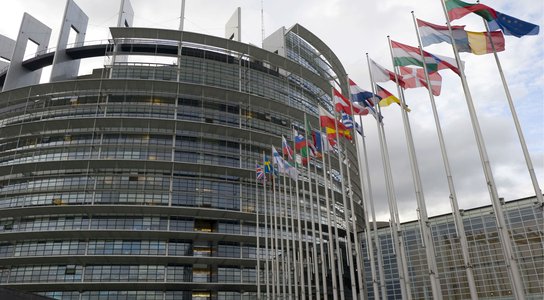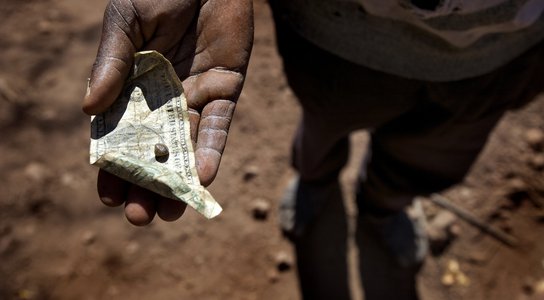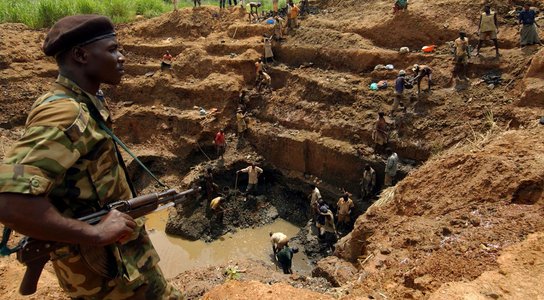Global Witness, as part of a broad civil society coalition, has, for many years, been campaigning for robust legislation to break the links between conflict, human rights abuses, and the minerals trade. Through our in-depth research and investigations we have seen first-hand the devastation caused by an irresponsible trade that thrives in the shadows. In seeking to unmask those who profit, we have learnt many of the tricks of this deadly trade.
We have studied international supply chains, and like those who seek to exploit them, we know where many of the weak links can be found. In addition to exposing the problem, we are committed to fixing the system that allows it. This page sets out the policy recommendations we have made to EU policy makers as the EU’s proposed legislation has developed through numerous rounds of negotiations.
- Civil Society Recommendations for Implementing the EU's Responsible Sourcing Regulation (March 2018) [EN] [FR]
- Civil Society Review of
Implementation of the EU's Responsible Sourcing Regulation (April 2019) [EN] [ES]
Following the EU's adoption of the responsible sourcing regulation, a lengthy phase-in period started. It gives companies, EU Member States, and EU institutions time to adjust to the new law. A number of important decisions will be made during this period, many of which will have a big impact on how effective the new law ultimately becomes. In this policy brief, Global Witness and other civil society organisations outline key recommendations for this "implementation period" to companies, Member State enforcement authorities, and the EU Commission to ensure the EU's new law is properly implemented and enforced, and ultimately delivers on its promise of more responsible mineral supply chains in Europe.
- EU Responsible Mineral Sourcing Regulation: Civil Society Response to the Council Mandate (February 2016) [EN]
Ultimately the Council accepted the need for mandatory measures, but only for companies that import minerals in their raw forms, as ores and metals. Unlike the Parliament, the Council chose to exempt companies that bring the very same minerals into the EU as part of component or products. The Council also proposed a standard would fall below the international agreed standard, undermining global progress towards more responsible sourcing. As the three institutions—Commission, Parliament, and Council—met to negotiate a final text based on their respective positions, this briefing urged participants to strengthen the Council’s proposal.
- EU Regulation on Conflict Minerals: What the European Parliament vote means for Member States (June 2015) [EN] [FR]; EU Regulations on Responsible Mineral Sourcing: Implementing the Parliament’s Proposed Due Diligence System (October 2015) [EN] [FR]
On 20 May 2015 the European Parliament took a big step forward by voting for a strong and mandatory law that would require all EU companies trading in minerals to undertake basic checks on their supply chains. Civil society were delighted, as policy makers had responded to many of our recommendations. But some Member States were not. When the European Council offered their opinion, many States feared the Parliament’s proposal was unworkable. In these papers Global Witness and Amnesty International called on Member States to back the Parliament’s proposal by explaining how making Europe’s supply chains more transparent and responsible could disrupt conflict financing.
- An Effective Response (May 2015) [EN]
Following the European Commission’s proposal, it was the European Parliament’s turn to examine it. This process started with the Parliament’s “International Trade Committee” (INTA), who were tasked with offering an initial opinion on all new proposals for trade regulation. The Committee’s recommendations strengthened the Commission’s proposal a little, but still made responsible sourcing voluntary for the vast majority of companies. Global Witness responded by calling on the Parliament to deliver on its commitment to more responsible supply chains by proposing truly robust and mandatory regulation
This diagram illustrates the due diligence process – the checks companies should undertake to ensure responsible sourcing – and how different parts of the supply chain can work together to source minerals responsibly and sustainably through transparent supply chains.
- A Conflict Minerals Regulation That Works (February 2015) [EN]
The European Commission agreed to act, but the proposed law would have been entirely voluntary and apply only to a handful of companies. In response, a group of NGOs, including Global Witness, made the case for a strong and binding law that would cover the whole supply chain, from raw materials to end-products.
You might also like
-
Briefing Conflict Minerals in Europe
After years of campaigning by Global Witness and civil society partners the EU has reached a political understanding on a new law intended to break the links between the minerals trade, conflict and human rights abuses.
-
Press release EU political agreement on conflict minerals risks allowing a deadly trade to continue
EU political agreement on conflict minerals risks allowing deadly trade to continue
-
Press release European Parliament defies lobbying to vote for strong conflict minerals regulation
Members of the European Parliament (MEPs) have made history by voting in favour of a strong and binding law to tackle the deadly trade in conflict minerals.